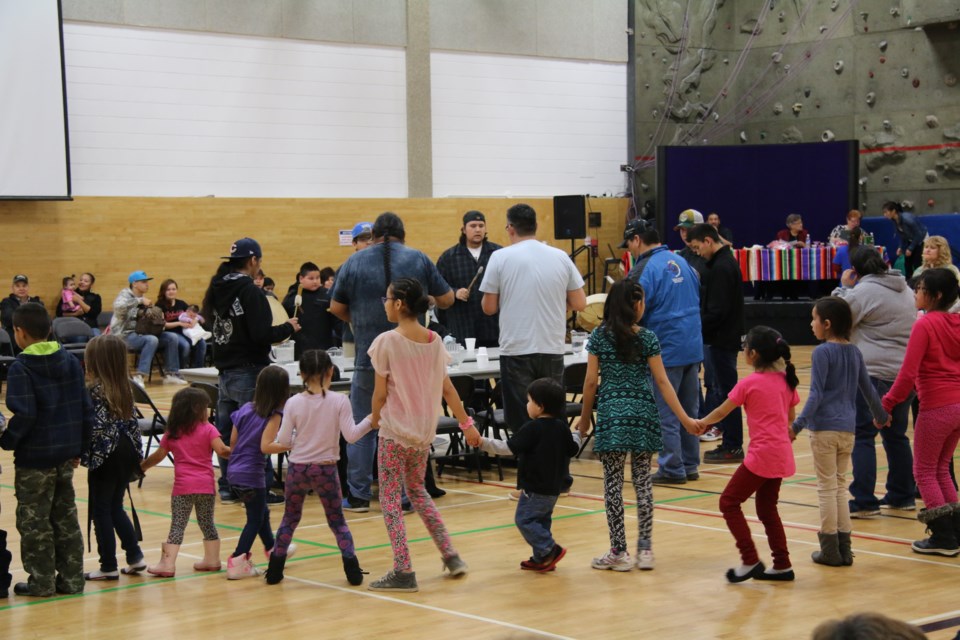It's a traditional aboriginal event, but it takes on its own spin here. Portage College in Lac La Biche recently held their 12th annual round dance to honour staff, students, and the wider community through an evening of dancing, singing and feasting on March 14.
It's a traditional aboriginal event, but it takes on its own spin here.
Portage College in Lac La Biche recently held their 12th annual round dance to honour staff, students, and the wider community through an evening of dancing, singing and feasting on March 14.
As Robert Rayko, the college's aboriginal counsellor, explained, round dances are traditionally collaborative events in First Nations culture, where the community comes together in an event centred around honoring ancestors who have died. But the Portage event centers around honoring a living person, so the mood is less solemn and more celebratory.
This year's honoree was Jim Henson, the college's security supervisor, a man widely respected for the work he puts in to keep the college and its affiliated housing safe.
"Jim is a supervisor of security, but he's more than that," Rayko said. "He works with our students in housing...he's got such a good rapport with our students and works closely with them so they can be successful."
While many of its elements were traditional, Rayko said the event did depart from a standard round dance in some ways.
"Our round dance is a little bit different, but we're allowed to get away with it," said Rayko. He explained how Stuart McGillivray, the elder who led this year's event, weaves together tradition with some unique tweaks to make sure the entire college and Lac La Biche regional community feels included. "We can incorporate some stuff in our round dances that you normally wouldn't see," Rayko said.
This year's round dance was held in the college's gym, and over 300 people attended. The event included two large meals, prayer, song, the traditional circle dance, and a pipe ceremony. Some of the 29 drummers who performed came from as far away as Fort Chipewyan and Saskatchewan. Drummers are paid from the proceeds of raffle and 50/50 tickets, so their compensation reflects the generosity of the crowd.
While in previous years the event was held in Craigend Community Hall, this time moving to the Portage campus presented some challenges. The traditional round dance meals include wild game like moose and rabbit, but hunted meat isn't allowed in Portage's industrial kitchen. So organizers had to improvise.
"We didn't have our traditional moose and rabbit stews, because legal precedent dictates we can't cook those meats in the kitchen," said Trent Keough, president of Portage College. Instead, volunteers from the college's staff cooked up dishes like turkey, roast beef, macaroni and potato salad.
For the volunteers, it was an all-day affair. Cooking started early in the morning in preparation, the event's first meal was at 5:30 p.m., the second meal was at midnight, and some attendees stayed as late as 5:00 a.m.
While some of the attendees were Portage students, more were community members of all ages.
"They talked about how the round dance was about inclusion, and it was about celebrating and respecting the elders and the ancestors," said Keough. "When they prayed in Cree, they were praying for the ancestors of all people who had attended the round dance..it's a cultural practice of First Nations peoples, tied to their spirituality, [but] they've opened it to a broader experience."
Rayko and Keough said the round dance is reflective of the strong connection and overlap between the college community and local aboriginal communities, which has been evident since a group of aboriginal students kept a predecessor institution open in the 1960s through a protest sit-in.
"The aboriginal cultural context and connections are very deep here, because of [the college's] origins," Keough said. "While we'd never herald ourselves as an aboriginal college, what we have done is respected the historical roots of where this college came from. First Nations and Métis people were critical in laying the foundation for this college."
